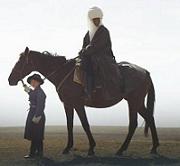| Saturday, 23 August 2014 00:00 |
|
"We Need a Hero" /Kyrgyzstan’s government bankrolls a historical epic meant to instill patriotism in a jaded and skeptical country. by Bakyt Ibraimov, 21 August 2014
OSH, Kyrgyzstan | When Kurmanzhan Datka: Queen of the Mountains premieres at the Montreal World Film Festival this week, the audience will see the usual elements of an epic tale: the march of time, huge set pieces, majestic scenery, and a hero (in this case, heroine) who faces enormous odds and ruthless foes. Most will likely know little about the events it depicts. But when Kurmanzhan Datka is released throughout Kyrgyzstan in the fall, audiences will be watching not just a movie but a government-sponsored attempt to instill a sense of patriotism in a people beleaguered by low living standards and a self-serving, smaller-than-life political class.
The film tells the story of the real-life “Queen of the Alai” in the 19th-century Khanate of Kokand, a kingdom that encompassed modern-day Uzbekistan, Tajikistan, Kyrgyzstan, southern Kazakhstan, and China’s Xinjiang Uyghur Autonomous Region.
Kurmanzhan – the “Datka” means “general” – is remembered for her fight against Russian imperial forces and, when surrender was unavoidable, for making the best peace possible. Famously, she allowed the execution of her own son on smuggling charges in order to avoid a rupture with Moscow.
“While watching the movie, I felt proud that in the history of the Kyrgyz people there was a woman as wise and strong as Kurmanzhan Datka,” said Akylbek Tashbulatov, director of an organization that advocates for the rights of migrant workers from Kyrgyzstan. Tashbulatov saw an early version of the film this month at a forum in Bishkek for members of the Kyrgyz diaspora.
Tashbulatov, who said he was moved nearly to tears by the film, said Kurmanzhan’s political wisdom and self-sacrifice could serve as a role model not only for ordinary citizens of Kyrgyzstan but also for the country’s politicians.
Cholpon Idrissova, spokeswoman for the Aitysh studio, which co-produced the film, was not shy about its aims.
“Unfortunately, young people in today’s Kyrgyzstan don’t know much about our history,” she said. “The film is a visual legacy for the next generation, an attempt to arouse a spirit of patriotism among the young Kyrgyz, preserve the history, and perpetuate the names of national heroes.”
Neither Idrissova nor Tashbulatov said they saw anti-Russian sentiments in the film.
“Yes, geopolitics is shown,” Tashbulatov said. “And its presence is natural. All countries have their interests.”
The film covers Kurmanzhan’s life from young womanhood to her death at in her mid-90s, with different actresses playing her at different stages. Nazira Mambetova, one of Kyrgyzstan’s most famous actresses and a recipient of the country’s highest cultural honor – being named a “People’s Artist” – portrayed the heroine from age 50 to age 90.
“I’ve played hundreds of roles in the theater and movies in my 43-year career, but this role has been the most special,” Mambetova said.
The actress said Kurmanzhan catches the imagination because she took action, unlike the men around her, and that Kyrgyzstan today lacks a leader who could help the country overcome its social and economic divisions.
Those divisions are many. More than one-third of Kyrgyzstan’s population lives in poverty,according to the World Bank. The national statistics agency puts the average monthly salary (pdf) at 11,845 soms ($226). Many citizens of Kyrgyzstan have an exceedingly low opinion of their leaders. A combination of corruption, incompetence, and nationalism has hindered foreign investment, and some politicians are adept at exploiting tensions between the countries’ ethnic groups. Kyrgyzstan’s governments were overthrown in 2005 and 2010, and in June 2010 horrific ethnic violence in the country’s south killed hundreds of people, mostly ethnic Uzbeks, and displaced tens of thousands.
Since April, residents of southern Kyrgyzstan have been without natural gas after the national supplier was sold to Russia’s Gazprom and neighboring Uzbekistan then turned off supplies. Electricity shortages and the approach of winter have left people in the region particularly outraged.
TOP-DOWN FILMMAKING
Whatever its artistic merits, or its commercial prospects with a modern audience,Kurmanzhan Datka is the product of old-fashioned Soviet-style planning. It was made by the private Aitysh studio along with the government-owned Kyrgyzfilm company, with public funds.
The idea for the production came from Zhyldyz Zholdosheva, a lawmaker from the nationalist Ata-Zhurt party. Gulbara Tolomusheva, an expert on the cinema of Kyrgyzstan who worked as a consultant on the film, said Zholdosheva approached several directors before settling on Sadyk Sher-Niyaz, a businessman-turned-filmmaker who founded the Aitysh studio and chaired the national filmmakers union but at the time had not made a feature-length movie.
Shooting took three years, hindered by difficulties in getting access to some Soviet and Kyrgyzstani archives, Tolomusheva said.
After the film was completed and sent to the Culture Ministry, “it was discussed by representatives of the president, the parliament, the [Culture Ministry’s] cinematography department, national experts, and prominent cinematography experts, who concluded that the historical-epic film was made to an acceptable standard within the funds allocated by the government, and the film crew and actors perfectly accomplished the task,” Deputy Culture Minister Muktaly Bektenaliev said.
Another two or three historical films are planned “with the purpose of cultural development,” he said.
According to Tolomusheva, the government spent 70 million soms ($1.3 million) on the film, which employed about 10,000.
Director Sher-Niyaz said about 300 actors were involved in the shooting, which took place in St. Petersburg and various locations in Kyrgyzstan.
Critics of the project question its nation-building aspect as well as the cost to taxpayers.
“We must be careful in regard to making films with participation of the government,” said Adil Turdukulov, chairman of the Foundation for Progress think tank.
Turdukulov said that while it is appropriate for the government to help develop the country’s cinema – for example, by funding film schools, offering tax incentives to filmmakers, and holding festivals – spending public money on a large commercial production went too far.
In addition, Turdukulov said basic rules were violated in the making of Kurmanzhan Datka: there was no tender to find a director and no attempt to find private money for the production, and a novice was entrusted with the project.
Further, he said, the budget was not settled in advance, “which resulted in ‘our old disease’ of begging for money from the authorities again.” Halfway through shooting, Turdukulov said, Sher-Niyaz took the uncompleted film to the president, after which parliament approved a funding increase.
“I’d make sure that next time, if the government suddenly becomes generous enough to give money for a movie, the violations mentioned above are avoided. Then films will be made that are worthy of the talent of our people,” Turdukulov said.
Orunbek Samidinov, a prominent Osh attorney, characterized the epic as a public relations exercise for a country with major problems, including declining foreign investment, a patchy energy supply, and an increasing reliance on Russia for basic goods.
“The country is in poverty, the government is not doing anything to improve the situation, everything is getting worse, problems with gas and electricity force people to buy coal, and this [film] is additional [government] expenditures,” he said.
“Would it not be better to spend the money to purchase coal for the socially vulnerable part of the population?” the attorney added. “We lack someone like Kurmanzhan Datka who would lead the nation forward.” Bakyt Ibraimov is a journalist in Osh. Please open here
And also please open The Guardian
Some comments: Highlights: Interesting article. I'll watch the movie later. Patrick Samphire: Let's hope the movie gets released in the west. It looks interesting. And $1.3 million? That wouldn't cover the coffee on most Hollywood productions. oakwood: Kyrgyzstan is a country with a fascinating history, which I learnt something of, having recently visited it for work. Reagarding how best to spend the money. Well, its one of the most corrupt countries in the world (at least with relatively little violence). Its the corruption that kills the country's potential, not spending a million dollars on a film that could boost its tourism potential. Its on the historic Silk Route (at least one of the options). It is the country furthest from any sea or ocean. It has stunning mountain scenery. It has a culture with many similarities to Mongolia (though with no common border). This is good for the country. I hope I can get to see the film. |



